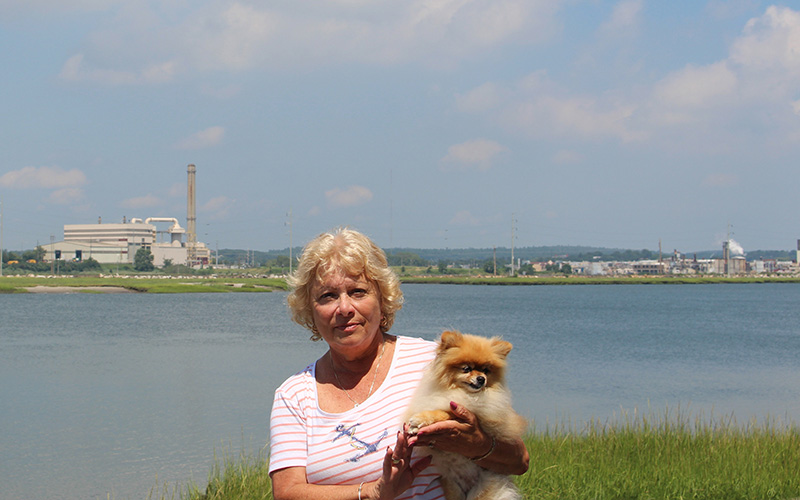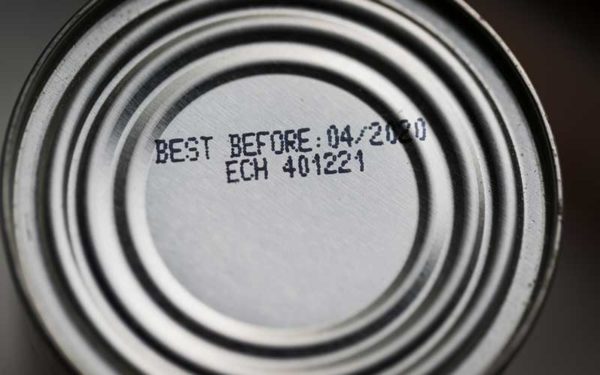
Doreen Weinberg of Revere, MA stands across the marsh where the Wheelabrator Landfill is located.
For more than 40 years, Wheelabrator Technologies has operated a landfill and an incinerator in the town of Saugus, Massachusetts. And, while the sprawling 277-acre facility sits in Saugus, its impacts on the surrounding towns of Lynn and Revere are just as dire. In fact, the only thing separating the facility from Revere is the environmentally protected Rumney Marsh.
Landfills of this type are notorious for releasing lead, mercury, and other cancer-causing chemicals into our air and water – so it’s no surprise that the surrounding communities are feeling the burden of their polluting neighbor.
The Real Costs of Burying and Burning our Trash
Both the health and life of the people living in the Revere neighborhood directly across from the landfill have been dramatically impacted by the presence of this waste facility. Illness, especially cancer, is rampant here, as well as in the other communities near the facility. While a direct link between cancer rates and toxins from the landfill hasn’t been proven, residents are forced to weather considerably high rates of illness – more than seems normal for a small Massachusetts town.
“Well, I have asthma, and I also lost my first child,” says Doreen Weinberg as she stands outside her home, the landfill visible across the marsh. “A 10-year-old boy down the street just died from cancer. We have maybe 9 streets [in this neighborhood], and I would say about 5 residents on each street [have cancer]. There’s a problem.”
“What Good is Having Lots of Money if You Are Sick?”
Wheelabrator, of course, disagrees with any suggestion that its facility is causing the increasing rates of cancer and illness suffered by residents in the surrounding area, instead blaming it on the lifestyles of those residents. The company brands itself as an active and friendly partner of the community – it donates to schools and other town organizations in Saugus – but donations cannot negate the permanent public health problems its facility may be causing.
The local government in the area, in addition to the broader community, has tried steadfastly to get this facility properly regulated and, ultimately, shut down.
Debra Panetta, a Saugus resident who serves as President of the Saugus River Watershed Council and Chair of the Saugus Board of Selectmen, has worked actively in defense of the people Saugus for years.
“As an elected official, I feel it’s our responsibility to take everything into consideration,” says Panetta. “I know it’s cliché, but without health you have nothing. What good is it having lots of money if you are sick? I just don’t want a sick community.”
A Landfill Long Overdue for Closure
Wheelabrator’s landfill was supposed to close in 1996, but more than 20 years after that deadline, the facility is still in full operation. What’s more, Saugus citizens tried to cap the landfill to a maximum height of 40 feet of waste, but the Massachusetts Department of Environmental Protection has allowed it to expand to 50 feet.
And nearby residents? None were given a say in their polluting neighbor’s expansion. Communities were not informed of this increase until after it was granted by the State – and this wasn’t the first time the community’s voice was excluded from the process.
“There are no notifications; we find out things after it’s done,” explains Weinberg.
We are All Saugus, Lynn, and Revere
Imagine living near this waste facility – how would your life be different? This landfill directly affects people living in Lynn, Saugus, and Revere, but it indirectly affects us all. The toxins and hazardous ash from the incinerator cause irrevocable harm to the clean air and clean water on which we all rely. And, whether we realize it or not, we’re affecting those who live around the landfill every week when we put our trash out to be sent to Wheelabrator.
But, even if you don’t live near Saugus, the greater Massachusetts community can help in its own way – by recycling more or limiting unnecessary waste whenever you can.
And, when the time comes, you can stand with Saugus, Revere, and Lynn against the harmful effects of landfill pollution. Advocating for proper regulations and shutting down big polluters is a community effort.
“People just need to know,” says Panetta when asked what can be done to help the community near the landfill. “They need to know what’s going on in their area, in their neighborhoods. And we need to try and find ways to try and protect those people. You can throw as much money at the town as you want, but if people are sick, it’s nothing.”



